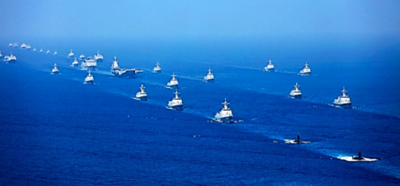South China Sea Showdown: What China-Philippines Tensions Mean for U.S. Security
 The South China Sea is one of the world’s most strategically and economically significant waterways. Spanning about 1.4 million square miles, this region is critically valuable not only for its fishing grounds, energy reserves, and biodiversity, but also as a major maritime thoroughfare. As China asserts its territorial claims in the South China Sea, primarily through the establishment of military outposts and frequent confrontations, other countries with overlapping claims—especially the Philippines—face escalating tensions. For the United States, a strategic ally of the Philippines, the situation raises questions about how the situation could unfold, and whether it will draw the U.S. into a greater geopolitical struggle.
The South China Sea is one of the world’s most strategically and economically significant waterways. Spanning about 1.4 million square miles, this region is critically valuable not only for its fishing grounds, energy reserves, and biodiversity, but also as a major maritime thoroughfare. As China asserts its territorial claims in the South China Sea, primarily through the establishment of military outposts and frequent confrontations, other countries with overlapping claims—especially the Philippines—face escalating tensions. For the United States, a strategic ally of the Philippines, the situation raises questions about how the situation could unfold, and whether it will draw the U.S. into a greater geopolitical struggle.
The U.S.-Philippines Alliance and Mutual Defense Treaty
The Philippines and the U.S. share a longstanding alliance dating back to 1951, formalized through the Mutual Defense Treaty (MDT). This treaty binds the U.S. and the Philippines to come to each other’s defense in the event of an armed attack in the Pacific, which includes the South China Sea. The U.S. has been clear about its stance on freedom of navigation in these waters, asserting that the South China Sea should remain open for all nations to use, and opposing any coercive actions that would inhibit that.
However, as China’s influence and military presence expands, the likelihood of conflict in these contested waters increases. Philippine vessels frequently encounter Chinese near the Philippine’s exclusive economic zones (EEZ), leading to diplomatic conflict, shows of military force, aggressive sabotage, and dangerously borderline violence. If an outright armed conflict were to occur, the MDT could be invoked, obligating the U.S. to assist the Philippines. This could result in sending U.S. military assets to defend Philippine territorial rights, putting the U.S. at direct odds with China.
 Ramifications for the United States
Ramifications for the United States
With over $5 trillion worth of trade passing through its waters annually, the South China Sea is an economic lifeline for global trade. The U.S. has substantial interests tied to this region as well, not just for direct trade, but also for the security of allied economies: Japan, South Korea, and Taiwan also all rely on unrestricted access to these sea routes. If China were to gain control of the South China Sea, it could exert an unprecedented amount of influence over global commerce, potentially imposing tariffs or other trade restrictions. This could disrupt global supply chains and raise costs for consumers worldwide, including those of the U.S.
Additionally, the South China Sea is rich in oil and natural gas reserves. Exclusive control over these resources could allow China to further its goal of becoming energy self-sufficient, shifting the balance of power in energy markets globally, and affecting U.S. energy companies with stakes in nearby countries.
Military Implications and the Risk of Escalation
For the U.S., the potential for military engagement in the South China Sea is a critical concern. Recent years have seen a rise in close encounters between U.S. and Chinese forces, as American naval vessels conduct “freedom of navigation” operations to challenge China’s expanding maritime claims. If tensions between the Philippines and China escalate into direct conflict, the U.S. would likely increase its presence– increasing the risk of a confrontation between two nuclear-armed powers.
U.S. involvement in a South China Sea conflict could strain already challenging relations with China in other areas, such as technology, cybersecurity, manufacturing, and trade in other international markets. China might retaliate economically by cutting off access to its own markets, or halting exports of rare earth metals needed for U.S. tech industries. The reciprocal escalation could lead to a broader decoupling of the U.S. and Chinese economies, leading to unpredictable, but likely severe consequences in many sectors.
The Strategic Importance of U.S. Military Presence
To counterbalance China’s influence, the U.S. has been strengthening its defense ties with allies in the region, including the Philippines, Japan, South Korea, Australia, and Vietnam. The purpose is to serve as a deterrent to any unilateral action by China in the South China Sea, as this would mean facing a coalition of forces rather than a single adversary. The recent expansion of U.S. military access to Philippine bases through the Enhanced Defense Cooperation Agreement (EDCA) is one example, as it enables the U.S. to rotate troops and preposition equipment in locations closer to contested waters.
 The Risk to Global Stability and the Role of Diplomacy
The Risk to Global Stability and the Role of Diplomacy
Conflict in the South China Sea, if unchecked, has the potential to destabilize the region, impacting global trade, energy supplies, and security. Given that the U.S. and China have nuclear capabilities, any escalation holds serious risks. Even a localized skirmish could quickly spiral into a broader conflict with far-reaching consequences. The U.S. has emphasized a diplomatic approach, calling for peaceful resolutions based on international laws such as the United Nations Convention on the Law of the Sea (UNCLOS). China’s consistent refusal to recognize the tribunal ruling in favor of the Philippines complicates diplomatic efforts.
 What Lies Ahead?
What Lies Ahead?
The South China Sea represents a complex arena, where economic interests, national pride, and military strategy intersect. The U.S. faces the delicate task of supporting its ally, the Philippines, while managing its own relationship with China. The risk of escalation remains high, and the impact of a conflict in the South China Sea could reverberate globally, affecting trade, energy markets, and international relations.
Ultimately, the situation in the South China Sea warrants careful and strategic approach. Whether through military deterrence or diplomatic engagement, the U.S. will likely remain involved, upholding regional stability while protecting the interests of America and its allies.
We at the Herd Law Firm are proud to fight for seamen, maritime workers and passengers in all types of personal injury and death claims. As maritime personal injury attorneys (and sailors ourselves!) located in northwest Houston, we never waver in our commitment to help these maritime workers, passengers, and their families when they are injured or mistreated.
11/1/2024
Image Credit: Xinhua News Agency, U.S. Navy Pacific Fleet, Unsplash










